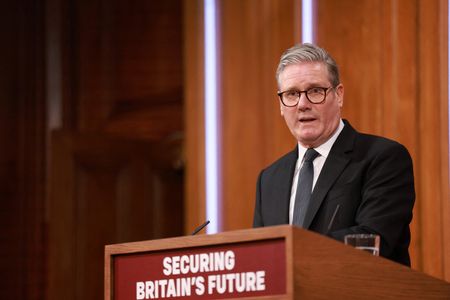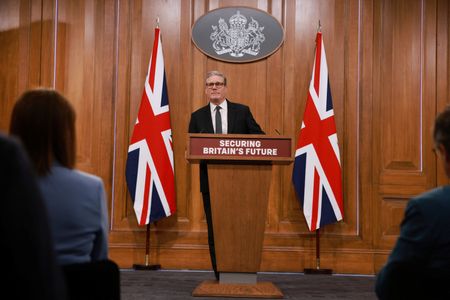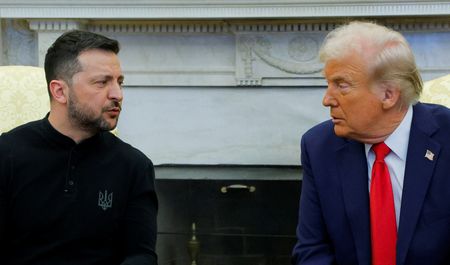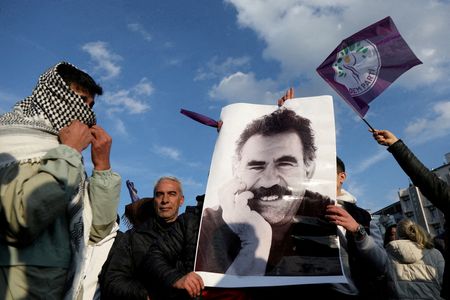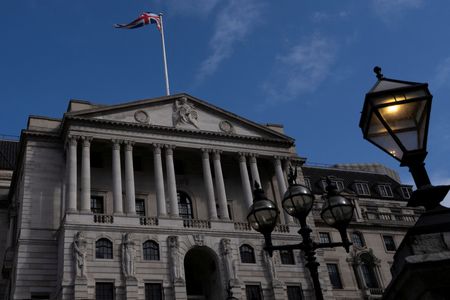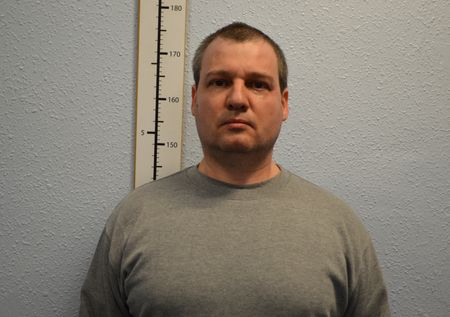By Andrew MacAskill and Sarah Young
LONDON (Reuters) -Prime Minister Keir Starmer promised on Monday to cut net migration to Britain significantly over the next four years, saying the country risked becoming “an island of strangers” without tougher rules on immigration.
Controlling immigration was a key factor in Britain’s 2016 vote to leave the European Union, yet net arrivals reached record levels after it left the bloc, helping to boost Nigel Farage’s right-wing, anti-immigration Reform UK party.
In a sweeping set of immigration reforms, Starmer’s centre-left Labour government said it would increase English-speaking requirements for immigrants, make it harder for them to stay in the country, and prevent companies including care homes from recruiting abroad.
The automatic right to apply for citizenship will only be granted to someone who has lived in Britain for 10 years, not five, and skilled worker visas will be restricted to graduate-level applicants.
“Make no mistake, this plan means migration will fall. That is a promise,” Starmer told reporters in Downing Street. “If we do need to take further steps… then mark my words, we will.”
He also rejected suggestions from business leaders that the tighter immigration rules would harm Britain’s economy, saying growth had stagnated in recent years while immigration surged.
“The theory that higher migration numbers necessarily lead to higher growth has been tested in the last four years,” he said. “That link doesn’t hold on that evidence.”
But he refused to set a target for net migration cuts, saying “arbitrary” pledges by previous governments had failed.
While the current plans have been in the works for months, government officials acknowledge they need to do more to address voters’ concerns about the high levels of immigration after Reform UK won the most seats in English local elections this month and opened a big lead in opinion polls.
‘PLAYING CATCH UP’
Farage accused Starmer, a former human rights lawyer, of “playing catch up” on the issue.
“Starmer is a hypocrite who believes in open borders… Nobody believes a word he says,” Farage said on X.
Immigration has long been a burning issue for British voters, with critics arguing that social cohesion can be damaged if the country does not build enough houses or expand public services to accommodate a larger population.
Starmer said nations depend on rules that set out rights and responsibilities, adding: “Without them, we risk becoming an island of strangers, not a nation that walks forward together.”
Refugee charity Care4Calais and some Labour lawmakers accused Starmer of fanning support for the far-right with such “dangerous language”.
Care4Calais CEO Steve Smith, recalling far-right riots in several British cities last year, said: “(Starmer) risks further race riots that endanger survivors of horrors such as war, torture and modern slavery. Starmer must apologise.”
Higher net numbers of foreign students, along with a rise in people arriving from Ukraine and Hong Kong, led immigration numbers to quadruple in the years after Brexit.
Net migration – the number of people coming to Britain minus the number leaving – hit a record 906,000 in the year to June 2023, up from 184,000 who arrived in the same period during 2019, when Britain was still in the EU.
But businesses argue they cannot hire enough staff locally, and employers in science, technology and other areas warn that tough restrictions will hit overall economic growth.
The new measures mainly relate to reducing legal immigration but the arrival of asylum seekers on small, often unseaworthy boats is an equally big challenge for the government.
One Labour lawmaker, who represents a constituency in northern England, told Reuters: “We will be making a big political mistake if we act tough on immigration, but then don’t have a solution” for the small boats.
(Additional reporting by William Schomberg and Alistair SmoutEditing by Kate Holton, Giles Elgood and Gareth Jones)

